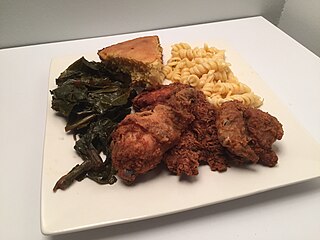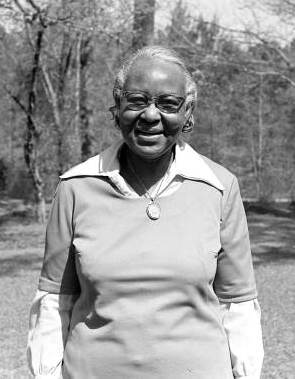Related Research Articles

Soul food is the ethnic cuisine of African Americans. It originated in the American South from the cuisines of enslaved Africans trafficked to the North American colonies through the Atlantic slave trade during the Antebellum period and is closely associated the cuisine of the American South. The expression "soul food" originated in the mid-1960s when "soul" was a common word used to describe African-American culture. Soul food uses cooking techniques and ingredients from West African, Central African, Western European, and Indigenous cuisine of the Americas.

The cuisine of the Southern United States encompasses diverse food traditions of several subregions, including cuisine of Southeastern Native American tribes, Tidewater, Appalachian, Ozarks, Lowcountry, Cajun, Creole, African American cuisine and Floribbean, Spanish, French, British, and German cuisine. In recent history, elements of Southern cuisine have spread to other parts of the United States, influencing other types of American cuisine.

Cornbread is a quick bread made with cornmeal, associated with the cuisine of the Southern United States, with origins in Native American cuisine. It is an example of batter bread. Dumplings and pancakes made with finely ground cornmeal are staple foods of the Hopi people in Arizona. The Hidatsa people of the Upper Midwest call baked cornbread naktsi. Cherokee and Seneca tribes enrich the basic batter, adding chestnuts, sunflower seeds, apples, or berries, and sometimes combine it with beans or potatoes. Modern versions of cornbread are usually leavened by baking powder.

The Mississippi Delta, also known as the Yazoo–Mississippi Delta, or simply the Delta, is the distinctive northwest section of the U.S. state of Mississippi that lies between the Mississippi and Yazoo rivers. The region has been called "The Most Southern Place on Earth", because of its unique racial, cultural, and economic history.
Clover is a genus of small, trifoliate plants.

Edna Regina Lewis was a renowned American chef, teacher, and author who helped refine the American view of Southern cooking. She championed the use of fresh, in season ingredients and characterized Southern food as fried chicken, pork, and fresh vegetables – most especially greens. She wrote and co-wrote four books which covered Southern cooking and life in a small community of freed slaves and their descendants.
Filbert is an unincorporated community in York County, South Carolina, United States, which was formerly incorporated. Filbert was disincorporated and annexed, mostly between York and Clover. Road signs still exist to proclaim this rural village. Filbert's only major roadway is U.S. Highway 321.
Vertamae Smart-Grosvenor was an American culinary anthropologist, griot, poet, food writer, and broadcaster on public media. Born into a Gullah family in the Low Country of South Carolina, she moved with them as a child to Philadelphia during the Great Migration. Later she lived in Paris before settling in New York City. She was active in the Black Arts Movement and performed on Broadway.

Chicken mull is a traditional dish from North Carolina, upstate South Carolina, and Georgia. It is a type of stew consisting of parboiled whole chicken in a cream- or milk-based broth, butter, and seasoned with salt, pepper, and other ingredients. Traditionally, the stew is served in the late fall and winter months. In northern Georgia, this part of the year is often referred to as "mull season". Often, the term "chicken stew" or "chicken mull" refers to an event or gathering where the dish is served.

John Martin Taylor, also known as Hoppin' John, is an American food writer and culinary historian, known for his writing on the cooking of the American South, and, in particular, the foods of the lowcountry, the coastal plain of South Carolina and Georgia. He has played a role in reintroducing many traditional southern dishes, and has advocated the return to stone-ground, whole-grain, heirloom grits and cornmeal production.
Southern Foodways Alliance (SFA) is an institute of the Center for the Study of Southern Culture at the University of Mississippi, dedicated to the documentation, study and exploration of the foodways of the American South. Member-funded, it stages events, recognizes culinary contributions with awards and a hall of fame, produces documentary films, publishes writing, and maps the region’s culinary institutions recording oral history interviews. The group has about 800 members, a mixture of chefs, academics, writers, and eaters.
Ronni Lundy, is an American author and editor, whose work focuses on traditional Southern American foods, Appalachian foods, and music.

The role of African Americans in the agricultural history of the United States includes roles as the main work force when they were enslaved on cotton and tobacco plantations in the Antebellum South. After the Emancipation Proclamation in 1863-1865 most stayed in farming as very poor sharecroppers, who rarely owned land. They began the Great Migration to cities in the mid-20th century. About 40,000 are farmers today.

Vibration Cooking: Or, the Travel Notes of a Geechee Girl is the 1970 debut book by Vertamae Smart-Grosvenor and combines recipes with storytelling. It was published by Doubleday. A second edition was published in 1986, and a third edition was published in 1992. The University of Georgia published another edition in 2011. Smart-Grosvenor went on to publish more cookbooks after Vibration Cooking. Vibration Cooking raised awareness about Gullah culture.
Phila Hach — pronounced "File-ah Hah" was an American chef, restaurant owner, innkeeper, and caterer who authored 17 cookbooks, including recipe collections for the 1982 World's Fair, Opryland USA and Cracker Barrel restaurants. She has been called the "grand dame of southern cooking" and counted as good friends Duncan Hines and Julia Child. Hach catered functions for the United Nations, U.S. mayors and governors, military personnel and celebrities, and was one of the pastry chefs at the wedding of Princess Diana.

Jessica B. Harris is an American culinary historian, college professor, cookbook author and journalist. She is professor emerita at Queens College, City University of New York, where she taught for 50 years, and is also the author of 15 books, including cookbooks, non-fiction food writing and memoir. She has twice won James Beard Foundation Awards, including for Lifetime Achievement in 2020, and her book High on the Hog was adapted in 2021 as a four-part Netflix series by the same name.

Flora Mae Hunter was an American cook and cookbook author. She was a longtime cook on plantations in northern Florida—in particular, cooking for 36 years at Horseshoe Plantation near Tallahassee, Florida. In 1979 she published a cookbook of recipes from her career cooking for the plantation's workers as well as the owners and guests, called Born in the Kitchen: Plain and Fancy Plantation Fixin's. In 1988, she was awarded a Florida Folk Heritage Award for her contributions to the "cultural resources" of the state.

The Virginia House-Wife is an 1824 housekeeping manual and cookbook by Mary Randolph. In addition to recipes it gave instructions for making soap, starch, blacking and cologne.
Benjamin "BJ" Dennis IV is an American Gullah Geechee chef and caterer from Charleston, South Carolina who is known for preserving Gullah Geechee cooking and culture. Additionally, he is also notable for his discovery of hill rice in December 2016 in Trinidad, which was thought to have been extinct.
References
- ↑ "Dori Sanders". Oxford Reference. Retrieved December 14, 2020.
- ↑ Golden, Susan L. (2006). "Sanders, Dori (1935?- )". In Elizabeth Ann Beaulieu (ed.). Writing African American Women: An Encyclopedia of Literature by and about Women of Color. Westport, Connecticut: Greenwood Press. pp. 768–9. ISBN 0-313-33197-9.
- ↑ "Sanders Peach Farm & Roadside Market". discoversouthcarolina.com. Retrieved April 17, 2016.
- ↑ "South Carolina's favorite fruit arrives early, stays late through summer". Post and Courier. Retrieved April 17, 2016.
- ↑ "Meet Dori Sanders". Southern Foodways Alliance. October 2011. Retrieved April 17, 2016.